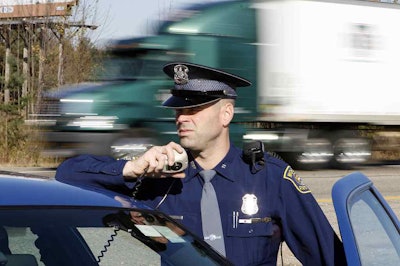 Michigan State Police will expand its roadside drug testing pilot program from five counties to statewide later this year.
Michigan State Police will expand its roadside drug testing pilot program from five counties to statewide later this year.A pilot program that allowed specially-trained Michigan State Police troopers to conduct roadside drug tests on suspected impaired drivers will soon be expanded from five counties to the entire state.
After the year-long Preliminary Oral Fluid Analysis pilot program conducted from Nov. 8, 2017, through Nov. 8, 2018, in Berrien, Delta, Kent, St. Clair and Washtenaw counties, MSP’s Oral Fluid Roadside Analysis Pilot Program Committee recommended to lawmakers that the pilot be expanded statewide for another year to gather more results and data.
“Expansion of this pilot program will allow a greater number of police departments in Michigan to take advantage of the expertise of participating [Drug Recognition Experts] to assist with traffic stops and drug-impaired driving investigations,” the committee says in its report. “Arresting drug-impaired drivers can be expected to mitigate serious injury and fatal traffic crashes throughout Michigan.”
In December, lawmakers in Michigan approved the expansion of the pilot program with an appropriation of $626,000 in supplemental funding. MSP says the second pilot will begin in the fall.
During the first year of the program, troopers conducted 92 roadside saliva tests in the five participating counties. Drug Recognition Expert (DRE)-observed driver behavior resulting in 89 arrests during the pilot, with 83 of those drivers testing positive on roadside saliva tests. Of the 89 drivers arrests, 79 consented to a follow-up blood test. Four negative test results were seen in all drug categories in the roadside testing throughout the pilot, the report states.
The roadside saliva tests show either positive or negative results for amphetamine, benzodiazepine, cocaine, methamphetamine, opiates and cannabis.
As of Dec. 20, 38 drivers had been convicted of 47 charges with 49 cases still pending a final court disposition. Additionally, one case was dismissed, and one case was not prosecuted. The convictions include charges of operating a vehicle while impaired, operating with the presence of a controlled substance, operating while intoxicated and more.
The testing and pilot program were inspired by a 2013 crash in which a 73-year-old couple, Barbara J. and Thomas J. Swift, were killed in a collision with a logging truck. The driver of the truck, Harley Davidson Durocher, was found to have marijuana in his system after the wreck.











